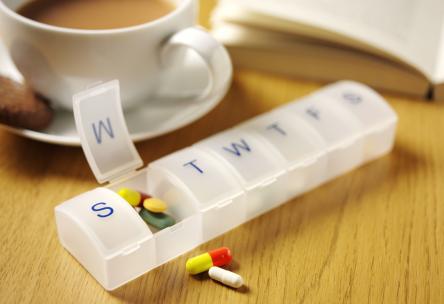Adhering to your medication regimen isn’t always easy. Let your doctor help

Managing multiple medications along with work, family, and other commitments? It’s understandable that you might forget a pill or dose here and there. But maintaining your medication cycle is key to maintaining your health and longevity. Pick up your prescriptions, and take this advice.
Educate yourself. Read the label on your prescriptions. Ask questions of your doctor or pharmacist, like, “What is this medicine for specifically?” Ask about dosage and timing, as well as potential side effects. Find out what to do if you miss a dose or accidentally take too much. Remember, no question is a bad one when you’re educating yourself. Write down the answers.
Double-check your medications at the pharmacy. It is a good idea to have all of your prescriptions filled at the same pharmacy. When picking up your prescription, make sure your name, the name of the medication, and the directions are correct. If the label isn’t readable, ask the pharmacist for help. It may sound silly, but make sure you can open the container. If you have any questions at all about the medication, or about your condition, ask the pharmacist before you leave the pharmacy counter.
Aspirin. Grapefruit. Other meds. Make sure all of your providers are aware if you take aspirin, either prescription or over-the-counter, as it can interfere with other medicines. Tell your doctor and pharmacist about all other prescription drugs, over-the-counter drugs, vitamins, and supplements you take, as they can also affect your medication efficacy. Check to see whether you should avoid any foods when taking your medication, such as grapefruit (and grapefruit juice), which can interact negatively with blood pressure and cholesterol medications, and which can cause an upset stomach when ingested with certain other medications.
Keep them cool. Heat and humidity from hot showers can cause medications to spoil, so the bathroom may not be the best place to keep them. Instead, store your medications a cool, dry place, away from direct sunlight. If children live with you or are at your home regularly, keep your medications out of their reach.
Stick with your routine. Take your medicine at the same time and place every day, creating a routine that’s easier to remember. Use helpful tools like an alarm on your phone or a note on the mirror to remind yourself.
Take as directed. Take medicines exactly as prescribed. This is especially true if you are taking medicine for a chronic condition, like high blood pressure, diabetes, or arthritis. Do not discontinue a prescription medication unless your doctor says it is OK.
Report side effects. Tell your doctor if you experience side effects, are having trouble affording your medication, or think your medication is no longer working. Address any medication issues with your doctor immediately.


